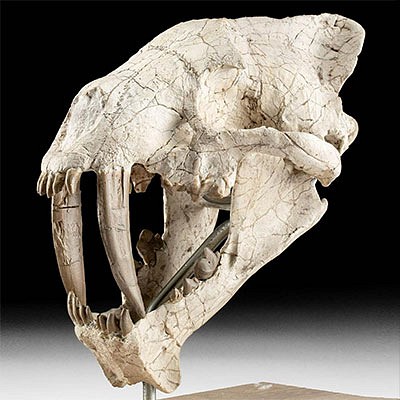Large 18th C. Indian Stone Panel w/ Ganesh
Lot 53
About Seller
Artemis Gallery
686 S Taylor Ave, Ste 106
Louisville, CO 80027
United States
Selling antiquities, ancient and ethnographic art online since 1993, Artemis Gallery specializes in Classical Antiquities (Egyptian, Greek, Roman, Near Eastern), Asian, Pre-Columbian, African / Tribal / Oceanographic art. Our extensive inventory includes pottery, stone, metal, wood, glass and textil...Read more
Categories
Estimate:
$4,000 - $6,000
Absentee vs Live bid
Two ways to bid:
- Leave a max absentee bid and the platform will bid on your behalf up to your maximum bid during the live auction.
- Bid live during the auction and your bids will be submitted real-time to the auctioneer.
Bid Increments
| Price | Bid Increment |
|---|---|
| $0 | $25 |
| $300 | $50 |
| $1,000 | $100 |
| $2,000 | $250 |
| $5,000 | $500 |
| $10,000 | $1,000 |
| $20,000 | $2,500 |
| $50,000 | $5,000 |
| $100,000 | $10,000 |
| $200,000 | $20,000 |
About Auction
By Artemis Gallery
Jul 13, 2021
Set Reminder
2021-07-13 12:00:00
2021-07-13 12:00:00
America/New_York
Bidsquare
Bidsquare : Fauna, Flora, Stones & Bones
https://www.bidsquare.com/auctions/artemis-gallery/fauna-flora-stones-bones-7214
Join us for a very special summer auction featuring fabulous fossils, rocks, and minerals, plus art depicting flora and fauna from antiquity to present day. This is one you won't want to miss! Artemis Gallery info@artemisgallery.com
Join us for a very special summer auction featuring fabulous fossils, rocks, and minerals, plus art depicting flora and fauna from antiquity to present day. This is one you won't want to miss! Artemis Gallery info@artemisgallery.com
- Lot Description
South Asia, India, ca. 18th to 19th century CE. Finely carved in relief from a single block of stone, this is a high relief hand-carved stone panel of the deity Ganesh, standing upon a shelf. Ganesh (also Ganesha or Ganapati), is the elephant-headed deity known as the "Remover of Obstacles." He leans to one side as if swaying to music. Although aged and faint, he appears to hold an attribute in both hands. He wears an elaborate headdress and bangles on his feet. The portly stomach is characteristic of this god's love of sweets. The surface retains much of the original red and orange pigments from when this piece was a vibrant architectural element. The panel verso is flat, likely resided in a temple or shrine. Size: 14.25" L x 6.5" W x 18.5" H (36.2 cm x 16.5 cm x 47 cm)
Esteemed as one of the principle deities of the Hindu pantheon, the first son of Shiva and Parvati, Ganesha is known as the Lord of Plenty or the god of auspiciousness, highly revered as the regulator of all obstacles with the power to create and remove them. Followers traditionally ask for his blessings at the beginning of any new paths or serious endeavors. The origin of his unusual physiognomy, particularly how he came to possess such an unusual head is the source of many legends, the most popular is that one day when Shiva was away from home, Parvati created a human son from her own body. She asked her son to guard the door while she was bathing. Quite unexpectedly, Shiva returned home, and the boy would not allow Shiva to enter his own household. Enraged by this, Shiva cut off the boy's head. Parvati grew quite angry and ordered Shiva to replace his head. Shiva did so with the first living being he encountered: an elephant.
This piece has been searched against the Art Loss Register database and has been cleared. The Art Loss Register maintains the world's largest database of stolen art, collectibles, and antiques.
Provenance: private Los Angeles County, California, USA collection
All items legal to buy/sell under U.S. Statute covering cultural patrimony Code 2600, CHAPTER 14, and are guaranteed to be as described or your money back.
A Certificate of Authenticity will accompany all winning bids.
PLEASE NOTE: Due to recent increases of shipments being seized by Australian & German customs (even for items with pre-UNESCO provenance), we will no longer ship most antiquities and ancient Chinese art to Australia & Germany. For categories of items that are acceptable to ship to Australia, please contact us directly or work with your local customs brokerage firm.
#160190Softening of details. Surface weathering, chips, and small cavities as expected with age and exposure. Panel is sturdy and robust. Great traces of painted pigments and light mineral deposits!Condition
- Shipping Info
-
All shipping is handled in-house for your convenience. Your invoice from Artemis Gallery will include shipping calculation instructions. If in doubt, please inquire BEFORE bidding for estimated shipping costs for individual items.
-
- Buyer's Premium



 EUR
EUR CAD
CAD AUD
AUD GBP
GBP MXN
MXN HKD
HKD CNY
CNY MYR
MYR SEK
SEK SGD
SGD CHF
CHF THB
THB













